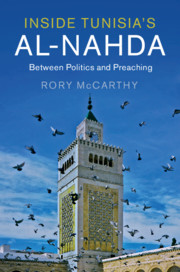Book contents
- Inside Tunisia’s al-Nahda
- Cambridge Middle East Studies
- Inside Tunisia’s al-Nahda
- Copyright page
- Dedication
- Contents
- Acknowledgements
- Note on Transliteration
- Abbreviations
- 1 Introduction
- 2 Morality, Behaviour, and Networks
- 3 Rethinking Politicization
- 4 Confronting Prison
- 5 Beyond Social Exclusion
- 6 Rebuilding and Fragmenting
- 7 Conclusion
- Notes
- Bibliography
- Index
- Books in the Series
- References
Bibliography
Published online by Cambridge University Press: 21 September 2018
- Inside Tunisia’s al-Nahda
- Cambridge Middle East Studies
- Inside Tunisia’s al-Nahda
- Copyright page
- Dedication
- Contents
- Acknowledgements
- Note on Transliteration
- Abbreviations
- 1 Introduction
- 2 Morality, Behaviour, and Networks
- 3 Rethinking Politicization
- 4 Confronting Prison
- 5 Beyond Social Exclusion
- 6 Rebuilding and Fragmenting
- 7 Conclusion
- Notes
- Bibliography
- Index
- Books in the Series
- References
- Type
- Chapter
- Information
- Inside Tunisia's al-NahdaBetween Politics and Preaching, pp. 209 - 230Publisher: Cambridge University PressPrint publication year: 2018

